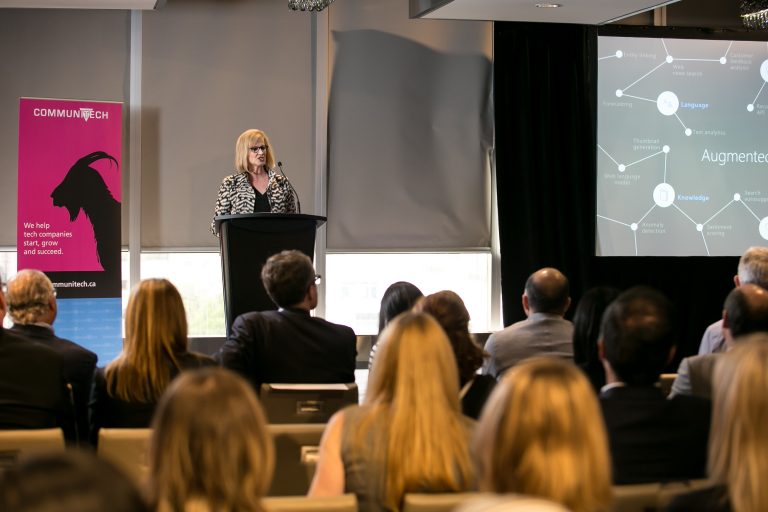Four champions. Four points of view.
And perhaps the bottom line, or common theme, from Wednesday evening’s event entitled “Transformative Tech – Winners and Losers,” is that integrating people, accommodating the analogue creatures called human beings, as our world is remade by transformative technologies, is a problem still in search of a solution.
“Before we think about AI or blockchain, or the Internet of Things, we have to understand what it is that people want,” Zahra Ebrahim, Co-leader of Doblin Canada, told the audience of 150 at Toronto’s Arcadian Loft. Doblin is a global innovation consulting firm with an office in Toronto.
“What is the nuanced need that we’re trying to serve, the thing [people] don’t have language to talk about yet? How do we get to that first so we can make the right investments once instead of making more expensive investments twice?”
Ebrahim’s discussion, the theme of which directly addressed the issue of technology as it relates to the people it’s designed to serve, was preceded by three other discussions: Geoffrey King, Cisco Canada’s National Director, Industry Digitization, Financial Services, spoke about the impact of the Internet of Things; Janet Kennedy, President of Microsoft Canada, addressed the transformative potential of artificial intelligence; and Alan Wunsche, CEO and founder of TokenFunder, detailed the disruptive power of blockchain technologies.
The event was organized by Communitech and moderated by Steve Patterson, host of CBC Radio’s The Debaters. Sponsors included TD, Cisco, Deloitte and Microsoft.
Each of the speakers made it clear that all three technologies – IoT, AI and blockchain – are exponentially growing in influence and are changing the place and role that people have in their own world.
“I was in a bank that required us to do 55 countries worth of data reconciliation on a monthly basis,” said Wunsche. “That can all go away if we all had one simple ledger. [There’s a] huge amount of time savings.”
IoT capability, King said, is replacing people as data gatherers in the field across a host of verticals. The number of connected devices will grow, he said, from 6.4 billion in 2016 to 50 billion three years hence.
And AI, said Kennedy, is “in my opinion, the most disruptive technology hitting the FinTech industry today.”

Janet Kennedy, President of Microsoft Canada, discusses the impact of artificial
intelligence at a Toronto event Wednesday organized by Communitech entitled
Transformative Tech. (Photo: Dhoui Chang)
“He had a demo speaking in Chinese, translating directly into English, and then [used] PowerPoint to do the captioning underneath it in Spanish.”
It was left to Ebrahim to contextualize the changes that tech is generating. She described a project she was involved with that was designed to improve access to old-age benefits for seniors. The Canadian government, she said, had a pot of money, $226 million, that it wanted to use to design a website and app in order to help seniors gain information about available government benefits. Problem was, most seniors, she said, were using the Internet merely for reading the news and looking at pictures of their kids on Facebook. They didn’t use the Internet for interfacing with government.
Her team, instead, spent just $2 million, creating an interactive, 26-page PDF document that they made available for the social agencies to whom seniors most often turn for financial help.
“My technology is analogue, my technology is people,” said Ebrahim.
“We see this all the time; we massively invest in technologies ahead of knowing what people actually want.”
Rizwan Khalfan, TD Bank Group Executive Vice-President & Chief Digital and Payments Officer, provided the event's closing remarks. The evening's discussion was preceded by a Collision Day hosted by TD. The bank's leadership team met with eight startups, each of which made pitches and received feedback on their businesses, their potential and concepts.

